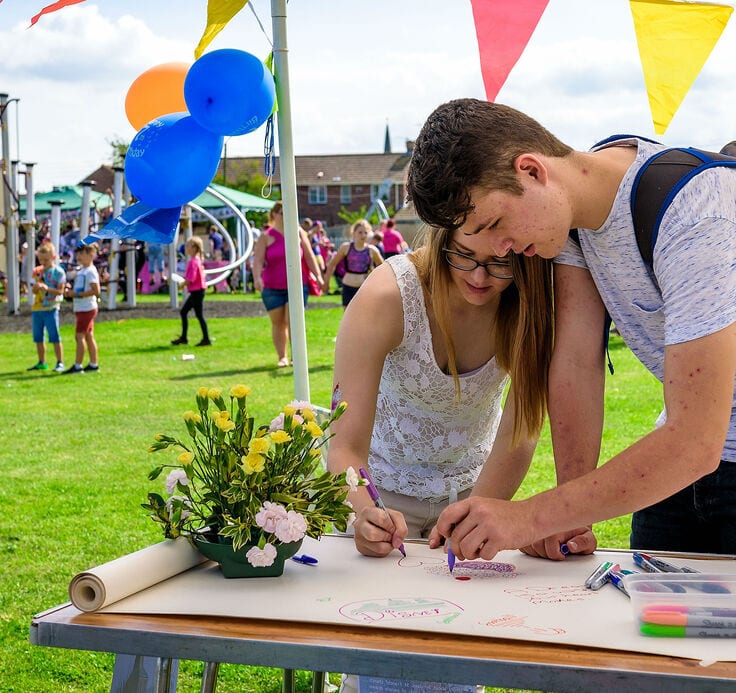
“Having a good environment is about hope, it encourages good feelings and positivity - and this is a key starting point."
The quality of the local environment is an issue that affects everyone and one that most of the residents who are part of the Local Conversation programme choose to address as one of their top priorities.
Residents have found that there can be many benefits to addressing environmental issues in their neighbourhood, including increasing involvement and pride within the neighbourhood, building confidence and skills and strengthening local control.
Having a good environment is about hope and can often act as a catalyst for bigger action, says John Hume, the Trust’s Chief Executive.
John said: “Over the past few years, I’ve spent time with many residents who have improvement to their environment in their sights. Two of these particularly struck me though. One resident in the North West told me how difficult it was to be optimistic and encourage their children to think about their positive future when you opened the door to go to school and the street and gardens were uncared for.
“On a different visit to the North East, a resident talked about her walk to school with her children and how she spent most of it telling them to watch out for the broken glass, or to avoid the dog mess. Far from being a nice start to the day, she described it as a really stressful ten minutes for all of them.
“Having a good environment is about hope. It encourages good feelings and positivity - and this is a key starting point. It’s also tangible and something you can really get your teeth into, which is probably why it’s a key neighbourhood priority for most of the Local Conversations residents.”
In Sparkbrook, Birmingham, local people have found that taking part in environmental action has helped them gain confidence and learn new skills.
The ‘Clean Sparkbrook’ steering group organised clean-up activities with school children to improve their neighbourhood. The group of young women leading the work learnt how to conduct risk assessments associated with working with children. They also liaised with the council to borrow the equipment they needed.
In only a few months, they have developed their organisational skills, as well as a better understanding of how to work effectively with the local authority. They are now feeling more connected to their community and have the confidence to take on more ambitious actions, such as developing a good landlord’s scheme. They also want to continue to work with their local council, the school and the local media.
In a recent webinar organised by the Trust, residents and practitioners from ten Local Conversation programme projects spoke about the benefits of environmental action.
In Longbenton, Newcastle, they found that taking part in environmental activities is a strong pathway towards greater involvement and control for many local residents.
Action began there five years ago, when a resident tweeted the council about her concerns around taking her children to the local park. Developing from a simple tweet, residents involved with the project have gone on to support a campaign to make the park safer and more accessible. They now hold regular events in the park to raise awareness and fundraise.
The council is now also supporting the campaign group, and has provided £3,000 for an accessible swing, as well as providing administrative support and carrying out health and safety assessments.
In Claremont, Blackpool, residents highlighted that making small visible changes to the environment – a practice often referred as ‘beautification’ – has worked as a catalyst for further action.
Members of the Local Conversation in Ten Streets worked to clear their alleyways and turn them into a place for local people to get together and plant colourful flowers and hanging baskets.
The environmental action group also installed the street planters and hanging baskets in the most littered alleyways in the area, which helped to promote the programme and encourage residents not yet involved to participate.
Now, they regularly organise street clean-ups and neighbourhood competitions that have increased the sense of pride and ownership in the community.
Seeing small changes in the area has helped build local people’s confidence, and they are now looking at bigger issues they want to focus on.
Many Local Conversations projects are benefiting from the small-scale changes to their local environment, which is such an important determinant of health, as a direct result of the action they have taken. But local environments are challenging, and these issues are part of a much broader, complex local picture - in which independent decision-makers - such as rogue landlords providing poor housing - can prove difficult to influence.
Future efforts may need to be directed towards tackling the root causes of local environmental issues, and acting on more ambitious ideas with local and national partners, in order to scale up and sustain environmental action.
The discussion and action around local environmental issues is as relevant and as pressing as ever this year, and we welcome input from other Trust-funded projects facing similar issues.
To register your interest in joining this discussion, please contact us.
